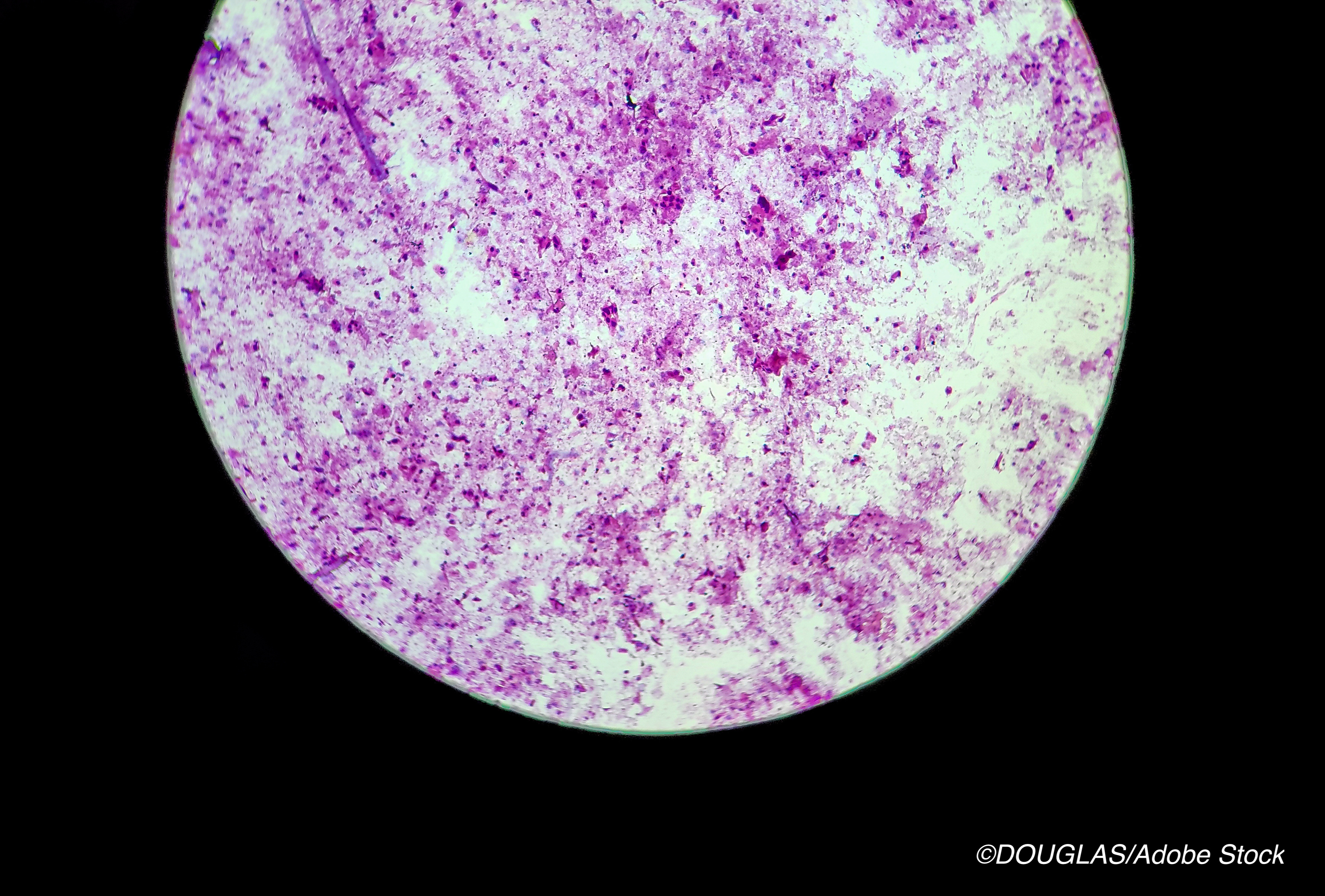
Adjuvant therapy with nivolumab after radical surgery for muscle-invasive urothelial carcinoma increased disease-free survival by roughly 10 months in a phase III trial, researchers reported.
The trial randomized 353 patients to nivolumab (240 mg intravenously) every two weeks and 356 to placebo for up to 12 months, wrote Dean J. Bajorin, MD, of Memorial Sloan Kettering Cancer Center in New York, and colleagues in The New England Journal of Medicine.
“The median disease-free survival in the intention-to-treat population was 20.8 months (95% confidence interval [CI], 16.5 to 27.6) with nivolumab and 10.8 months (95% CI, 8.3 to 13.9) with placebo…The median survival free from recurrence outside the urothelial tract in the intention-to-treat population was 22.9 months (95% CI, 19.2 to 33.4) among patients who received nivolumab and 13.7 months (95% CI, 8.4 to 20.3) with placebo,” they added.
The fully human IgG4 antibody, nivolumab, targets programmed death ligand 1 (PD-L1) and 140 patients in the nivolumab arm had PD-L1 expression levels >1%, as did 142 patients in the placebo arm. In the nivolumab arm, 74.5% of those with elevated PD-L1 expression were alive and disease-free at 6 months versus 55.7% of placebo patients with PD-L1 expression >1%—a relative risk reduction of 45% (P<0.001).
Patients treated with nivolumab had longer distant-metastasis-free survival than those in the placebo arm. “In the intention-to-treat population, the median distant metastasis–free survival was 40.5 months (95% CI, 22.4 to could not be estimated) among patients who received nivolumab and 29.5 months (95% CI, 16.7 to could not be estimated) among those who received placebo,” they wrote.
In the intention-t0-treat analysis, almost half of patients had resected lymph nodes and 43.3% of nivolumab patients and 43.5% of placebo patients had neoadjuvant cisplatin-based chemotherapy. “A higher probability of disease-free survival with nivolumab than with placebo was observed regardless of nodal status, PD-L1 status, or use or nonuse of previous neoadjuvant cisplatin-based chemotherapy.”
There were more treatment-related adverse events (TRAEs) in the nivolumab arm than in the placebo arm—77.5% of patients in the nivolumab arm reported TRAEs of any grade versus 55.5% of placebo patients. “The most common treatment-related adverse events of grade 3 or higher in the nivolumab group were elevations in the serum levels of lipase (5.1%) and amylase (3.7%) as well as diarrhea (0.9%), colitis (0.9%), and pneumonitis (0.9%),” they wrote.
There were two treatment-related deaths, both due to pneumonitis, in the nivolumab arm.
The authors noted that five-year survival for patients who undergo complete resection after neoadjuvant cisplatin-based chemotherapy is 60% or less, and these patients frequently have recurrence.
“Although adjuvant cisplatin-based chemotherapy may improve outcomes after definitive surgery in patients eligible for cisplatin who have not received neoadjuvant chemotherapy, no previous adjuvant systemic therapies have been shown to improve outcomes in patients not eligible for cisplatin or in those with pathological evidence of residual disease despite neoadjuvant cisplatin-based chemotherapy,” they wrote. “These initial results from CheckMate 274 show that adjuvant nivolumab extends disease-free survival for these patients and thus may affect clinical decision making in this context.”
This was an interim analysis of the CheckMate 274 trial, and the investigators acknowledge a number of limitations. The median follow-up of 20 months was an admittedly short duration, but at that point, “48.2% of the patients in the nivolumab group and 57.3% of those in the placebo group had already had disease recurrence or had died,” they noted.
Also, the data for overall survival are not yet mature, and they may “provide greater insight into the efficacy of nivolumab in this context. Previous studies have indicated that disease-free survival at 2 or 3 years is highly correlated with overall survival in patients with muscle-invasive urothelial carcinoma.”
Finally, Bajorin et al concluded that disease-free survival was “significantly longer with adjuvant nivolumab than with placebo among patients with high-risk muscle-invasive urothelial carcinoma after radical surgery with curative intent. Further follow-up is planned to assess overall survival. Nivolumab monotherapy was associated with the expected level of toxicity, and no deterioration in quality of life was observed relative to placebo. The CheckMate 274 trial showed a significant and clinically meaningful benefit of adjuvant systemic immunotherapy as compared with placebo, both in the intention-to-treat population and in patients with a PD-L1 expression level of 1% or more.”
- Nivolumab monotherapy increased disease-free survival post surgical resection for muscle-invasive urothelial carcinoma.
- Note that in the CheckMate 274 trial, nivolumab treatment increased survival irrespective of PD-L1 expression.
Peggy Peck, Editor-in-Chief, BreakingMED™
The CheckMate 274 trial was supported by Bristol Myers Squibb in collaboration with Ono Pharmaceutical.
Bajorin reported receiving consulting fees from Bristol Myers Squibb, Fidia Pharma USA, and Merck; and a grant from the National Institutes of Health.
Cat ID: 120
Topic ID: 78,120,730,120,935,192,925,163


